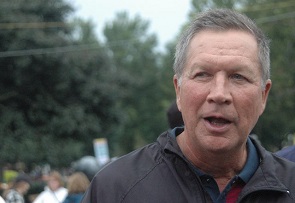WASHINGTON, Aug. 6, 2015 - Donald Trump came out combative in the first Republican presidential debate and drew boos right off the bat by refusing to pledge his support for the eventual GOP nominee if it’s not him.
The front-runner in the polls was center stage, literally and figuratively, as the other nine candidates struggled to break out of the pack in the debate that was held in Cleveland’s Quicken Loans Arena, which will be the site of the 2016 GOP convention.
The businessman was the lone candidate to raise his hand when the first question to all the candidates was whether they would commit to support the party's eventual nominee. Refusing to do so, Trump said, gives him “a lot of leverage.”
Despite the boos from the audience, he insisted, “I will not make the pledge at this time.”
Nearly all of the candidates avoided major mistakes or gaffes, with the possible exception of Trump, who may have hurt himself with female voters when he attacked Fox News moderator Megyn Kelly for questioning him about his past remarks about women.
The three sitting governors on the stage, Chris Christie of New Jersey, John Kasich of Ohio and Scott Walker of Wisconsin, as well as former Florida Gov. Jeb Bush, all argued that their records showed that they knew how to run a government and produce economic growth.
The stakes were especially high for Christie and Kasich, who are well back in the polls, and both had their moments, Christie using his past experience as a federal prosecutor to challenge Kentucky Sen. Rand Paul on privacy and surveillance policy. Kasich, drew cheers from the home-state audience as he vigorously defended his record in Ohio, including for expanding Medicaid.

Florida Sen. Marco Rubio, and to some extent Bush, tried to push a positive message. “If I’m the nominee we will be the party of the future,” Rubio said, citing Amazon as an example of how the economy has been radically transformed in recent years.
Said Bush, “We’re going to win when we unite people with a hopeful, optimistic message.”
Immigration dominated much of the early part of the two-hour debate.
Trump took credit for injecting the issue into the campaign, but he struggled when pressed to provide evidence for his claim that the Mexican government was sending criminals across the U.S. government. He finally attributed his information to unnamed Border Patrol agents who “say this is what’s happening because our leaders are stupid.”
Bush stuck by his position that illegal immigrants should be given a path to legal status and defended his comment that they enter the country as an “act of love" for their families. "It’s our responsibility to pick and choose who comes in," he said.
Challenging Trump’s attack on Mexico, Rubio noted that most of the recent immigrants come from Central America, not Mexico. But Rubio said Americans “feel like we’re being taken advantage of.”
Trade and regulations received limited attention during the debate than hot-button issues such as ISIS, education, economy, abortion and same-sex marriage.
But Trump used trade to support his theme that the country is in “big trouble. We don’t win anymore,” he said, citing Japan and China as countries that beat America at trade.
Rubio called for repealing the 5-year-old Dodd-Frank law, saying the financial regulations was “eviscerating small businesses and small banks.” He also called for a “regulatory budget” to limit the number of regulations that could be imposed.
Former Arkansas Gov. Mike Huckabee called for giving more responsibility to the states. “It’s not too big to shrink,” he said of the federal government.
One of the biggest stories of the day for the GOP didn’t involve any of the 10 candidates on the stage Thursday night, but rather Carly Fiorina, the former Hewlett-Packard CEO who was widely viewed as dominating an earlier debate between the seven candidates who didn’t qualify for the main event.
Fiorina forcefully took out after Trump as well as Democratic front-runner Hillary Clinton and President Obama. Trump, she said, “changed his mind on amnesty, health care and abortion. I would just ask what are the principles on which he would govern?”
Trump dominated the main debate time-wise, he got more than 11 minutes of air time, compared to less than seven for all of the other candidates except for Bush, according to calculations by The New York Times. Trump was pushed hard by the Fox moderators to explain past controversial comments and policy positions, and the bankruptcy filings for some of his properties.
Paul, who was not hesitant about challenging other candidates, interrupted Trump when he declined to pledge to support the GOP nominee. “He’s already hedging his bets on the Clintons,” he said.
Interested in following the Rural Route to the White House for 2016? Sign up for a free trial and great introductory rates. Just click here

